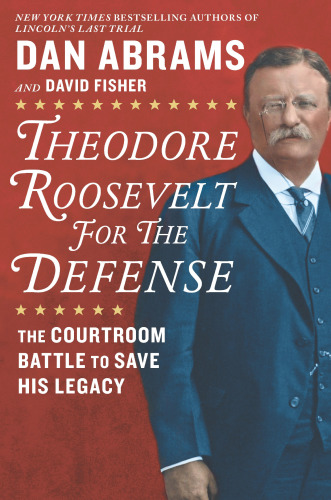
Theodore Roosevelt for the Defense
The Courtroom Battle to Save His Legacy
کتاب های مرتبط
- اطلاعات
- نقد و بررسی
- دیدگاه کاربران
نقد و بررسی

April 1, 2019
An account of a much-publicized early-20th-century trial that exposed "the sordid reality" of New York State politics. In April 1915, eager spectators filled a Syracuse courtroom in anticipation of a trial involving one of the most prominent men in America: former President Theodore Roosevelt, who was being sued for libel by party boss William Barnes over Roosevelt's published assertion that Barnes was corrupt. The trial yielded a 3,738-page typed transcript as well as colorful reports in newspapers across the country, sources that ABC's chief legal affairs correspondent Abrams and Fisher (co-authors: Lincoln's Last Trial: The Murder Case that Propelled Him to the Presidency, 2018, etc.) have mined thoroughly to produce a detailed--sometimes dramatic, sometimes humdrum--account of the drama. The abundant sources prove to be both a boon and a shortcoming: Not all of the 104 witnesses who testified during the trial were compelling; nor were some issues--such as Barnes' "alleged involvement in printing industry corruption," which occupied the court for many days. The highlight of the trial--and of this book--was the week that Roosevelt, "an explosion of energy," took the stand. As the New York Press reported, Roosevelt dominated the courtroom "with that marvelous personality of his and has won more friends in Syracuse than he made at any particular time." After more than 38 hours of questioning, heckled by the plaintiff's lawyers, who tried to goad him into anger, he emerged "smiling and happy and ready for more," stepping down from the stand and grinning at the jury. The trial was not the only news: War was brewing in Europe, and President Woodrow Wilson strained to keep America out of the fray. Roosevelt strongly urged engagement, a stand that worried his lawyers, who were fearful of alienating several jurors of German descent. Roosevelt held back from criticizing Germany--until the sinking of the Lusitania, "piracy accompanied by murder," he said, impelled him to urge America's immediate entry into the war. A feisty Roosevelt takes center stage in a mostly lively history.
COPYRIGHT(2019) Kirkus Reviews, ALL RIGHTS RESERVED.

May 13, 2019
Abrams, chief of legal affairs for ABC News, and Fisher follow up Lincoln’s Last Trial with another intriguing presidential courtroom procedural. This one is centered on a highly public 1914 libel claim brought by a New York state politician, William Barnes, against former president Teddy Roosevelt. Roosevelt had written that Barnes, a key player in the New York Republican machine, was corrupt and that his actions “deeply taint and discredit our whole government system.” Working with the transcript of the case, Abrams and Fisher dissect the legal maneuvering from jury selection to direct and cross-examination of the parties, witnesses called, judicial rulings, closing arguments, and the jury verdict. They provide insightful commentary on how the opposing lawyers, William Ivins for Barnes and John Bowers for Roosevelt, employed sophisticated courtroom strategies, tricks, and diversions, smartly deconstructing Ivins’s strategy of offering constant objections to Bowers’s examination of Roosevelt and Bowers’s skillful cross-examination of Barnes, which undercut small parts of earlier testimony. Many of the questions the trial raised about the effects of money in politics, the dangers of blind allegiance to party politics, and oversize corporate political influence will resonate with contemporary readers. Legal eagles and history buffs will enjoy this one. Agent: Frank Weimann, Folio.

May 15, 2019
In 1915, Theodore Roosevelt was again headline news, relegating war reports from Europe to newspapers' back pages. The reason? He was the defendant in a libel action brought by plaintiff William Barnes, a Republican Party powerbroker TR had known for years but had grown to despise, an antagonism capped by Barnes' instrumental role in denying TR the Republican presidential nomination in 1912. Two years later, TR denounced Barnes as a corrupt political boss, and Barnes sued. The six-week-long trial that ensued produced a 3,738-page-long transcript that prominent broadcast legal analyst Abrams and journalist Fisher, teamed up again after Lincoln's Last Trial (2018), tap to excellent narrative effect. Introducing the principal characters?the litigants, their attorneys, and the judge?the authors embark on a witness-by-witness account that, while intricate at times, displays each side's trial strategy, which mainly involved bashing each man as either corrupt or hypocritical. The heated arguments produced a parade of the period's New York politicos, with spectators and journalists crowding the courtroom. Maintaining suspense about the jury's verdict, Abrams and Fisher deliver a fine and timely legal drama.(Reprinted with permission of Booklist, copyright 2019, American Library Association.)

























دیدگاه کاربران